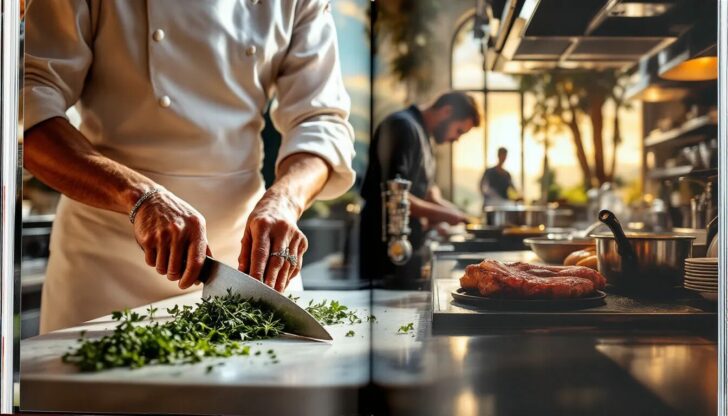Looking for good culinary schools to advance your skills? This article highlights the top culinary schools for 2024, focusing on programs that offer hands-on training and real-world experiences to set you up for success.
Table of Contents
Key Takeaways
Top culinary schools in 2024, such as CIA, Le Cordon Bleu, and Johnson & Wales University, provide comprehensive education with hands-on training and unique specializations.
The emphasis on sustainability and innovative teaching methods, alongside real-world experience opportunities, prepares students to meet industry demands.
Choosing the right culinary program involves considering factors like accreditation, curriculum, and financial aid options, impacting career advancement and job prospects.
Top Culinary Schools in 2024

In 2024, several best culinary schools distinguish themselves with exceptional culinary arts programs, classical techniques, and hands-on training. These institutions are recognized not only for their rigorous curriculum but also for their commitment to nurturing the next generation of culinary talent.
From the prestigious Culinary Institute of America with its global campuses to the historical Le Cordon Bleu, each school offers unique opportunities for aspiring chefs. Johnson & Wales University integrates academic coursework with practical experience, while the Institute of Culinary Education in New York City focuses on real-world applications.
The Auguste Escoffier School of Culinary Arts, with its small class sizes and farm-to-table philosophy, rounds out our list. These institutions offer distinct pathways to mastering the culinary arts.
Culinary Institute of America
The Culinary Institute of America (CIA) is renowned globally for its comprehensive culinary education. With campuses in Hyde Park, New York, St. Helena, California, San Antonio, Texas, and Singapore, CIA offers diverse programs in baking arts, pastry arts, culinary science, and wine and beverage studies.
Students benefit from state-of-the-art facilities and professional-grade kitchens, receiving top-notch training in real-world settings. The institute’s robust alumni network supports career advancement by connecting students with industry leaders and opportunities.
Le Cordon Bleu
Founded in 1895, Le Cordon Bleu is one of the most respected names in culinary education. Emphasizing classic French culinary techniques, the school offers programs in cuisine and patisserie, laying a strong foundation for aspiring chefs.
With campuses in Paris, London, Tokyo, and other locations worldwide, students can learn from master chefs and immerse themselves in diverse culinary cultures. This global presence enables Le Cordon Bleu to offer a truly international culinary education, preparing students to excel in the culinary world.
Johnson & Wales University
Johnson & Wales University (JWU) is known for blending academic coursework with hands-on training. With campuses in Providence, Rhode Island; North Miami, Florida; Denver, Colorado; and Charlotte, North Carolina, students experience diverse learning environments. The university’s programs integrate real-world experiences through valuable internships and job placement opportunities, ensuring students are well-prepared for the culinary industry.
This approach enhances practical skills and builds a strong foundation for future careers.
Institute of Culinary Education
Located in New York City, the Institute of Culinary Education (ICE) emphasizes hands-on learning and real-world experience. The institute offers specialized courses in wine studies, culinary and hospitality management, and food media, allowing students to tailor their education to their career goals.
ICE’s approach ensures students are skilled in the kitchen and equipped with the knowledge to succeed in various facets of the culinary industry.
Auguste Escoffier School of Culinary Arts
The Auguste Escoffier School of Culinary Arts stands out for its small class sizes, fostering personalized attention from instructors. Emphasizing farm-to-table experiences, the school teaches students about local ingredient sourcing.
With online program options, Escoffier offers flexibility for students to pursue their culinary education remotely. The curriculum, rooted in the techniques of Auguste Escoffier, ensures students receive a robust and relevant education.
Unique Features of Top Culinary Schools

Top culinary schools offer unique features that significantly enhance the learning experience and prepare students for successful careers. Innovative teaching methods, hands-on cooking classes, flexible programs, and real-world experience opportunities through internships and partnerships with local businesses are just some of the ways these schools go beyond traditional education.
Additionally, many institutions are focusing on sustainability, integrating farm-to-table practices and ethical sourcing into their curricula. These features make the learning process more engaging and ensure students are equipped with the skills and knowledge needed to excel in the culinary field.
Innovative Teaching Methods
Leading culinary schools use innovative teaching methods to enhance student engagement and retention. Classes often combine practical skills like food safety and menu planning with hands-on cooking experiences, catering to various learning styles and schedules.
Experiential learning techniques, such as working in professional-grade kitchens, ensure students are well-prepared for real-world culinary challenges.
Real-World Experience Opportunities
Culinary schools often partner with local restaurants, hotels, and catering companies to provide students with invaluable real-world experience through internships. These opportunities help students gain practical skills and industry connections, crucial for career advancement.
The school’s location can also influence the quality and variety of internship placements, providing students with diverse experiences.
Focus on Sustainability
Sustainability has become a critical focus in culinary education as the industry shifts towards more responsible practices. Many culinary schools incorporate farm-to-table initiatives into their curricula, teaching students about ethical sourcing and sustainable food practices.
These programs promote environmental awareness and prepare students to meet the growing demand for sustainable practices in the culinary industry.
Choosing the Right Culinary Program
Identifying your career goals is crucial when selecting a culinary program, as it helps tailor your educational path to fit your ambitions. Investigating multiple programs can align your choices with both personal and professional aspirations.
A formal culinary education equips students with industry-relevant skills, significantly improving job prospects and opening doors to various career opportunities.
Factors to Consider
When choosing a culinary school, consider factors like accreditation, curriculum, financial considerations, and available scholarships. Accreditation validates the quality of the education provided and can impact job prospects post-graduation.
The curriculum should offer a mix of hands-on cooking classes and theoretical courses in nutrition, food safety, restaurant management, and event planning. Financial considerations, such as tuition fees and financial aid options, are also crucial to ensure a good return on investment.
Degree Options
Culinary arts students can pursue various degree programs, including a culinary school degree, associate’s, bachelor’s, and certificates. Specialized courses, such as pastry arts, baking, and international cuisines, are often available to tailor education to specific career goals.
For those aiming for entry-level hospitality management jobs, a bachelor’s degree is commonly preferred, providing a solid foundation for higher-level positions.
Specializations and Career Paths
Graduates of culinary programs often access a wide range of career paths and higher-level positions. A culinary education opens diverse opportunities beyond traditional cooking roles, including positions in recipe development, culinary education, and food service management.
Specializations in pastry arts, food service management, and culinary nutrition provide focused training that can lead to various specialized career paths.
Impact of Culinary Education on Careers

Formal culinary education is not strictly necessary but can significantly facilitate career progression in various food-related fields. A quality culinary education provides the skills and knowledge to excel in the food industry, setting students apart and offering valuable experience.
Additionally, top culinary schools offer extensive networking opportunities through industry events and collaborations, crucial for career advancement. Institutions like the Culinary Institute of America are recognized for their extensive alumni networks, offering significant opportunities for graduates.
Skill Development and Creativity
Culinary schools offer hands-on culinary training in professional-grade kitchens to help students develop their skills. Curriculums cover essential subjects like culinary techniques, food preparation, cooking methods, pastry arts, and menu planning. Structured learning environments foster technical skills, creativity, and a refined palate.
Faculty members mentor students, sharing industry insights that guide their professional journeys.
Networking and Industry Connections
Culinary schools offer significant networking opportunities, enabling students to build relationships with industry professionals that aid career advancement. These connections are facilitated through internships, collaborations with local businesses, and industry events.
Effective networking and internship experiences are crucial for aspiring chefs, influencing career advancement and professional growth.
Career Advancement
A culinary education can lead to various careers, including roles such as caterer, restaurateur, and positions within hospitality management. With a culinary degree, individuals can become top chefs, lead hospitality management teams, and even own their restaurants.
Specializations within culinary arts can open roles in food service management, catering, recipe development, event planning, and menu development.
Financial Aid and Scholarships
Culinary students can access various financial aid options to help alleviate tuition fees. Given the financial challenges many students face, financial aid is crucial for managing costs and ensuring education is accessible to all.
A culinary school’s accreditation ensures it meets established educational standards, impacting financial aid eligibility.
Types of Financial Aid
Grants, loans, and work-study programs are common financial aid options for students pursuing culinary education. These options can significantly reduce the financial burden, allowing students to focus on their studies and practical training.
Culinary students may qualify for various types of financial aid to support their educational expenses.
Scholarship Opportunities
Scholarships can significantly reduce the financial burden for culinary arts students, helping them focus on their education and training. The National Restaurant Association Educational Foundation offers resources for students seeking scholarships. Specific scholarships, like those from the Les Dames d’Escoffier Colorado Chapter, support female culinary students.
Students should carefully read the eligibility criteria and application requirements for each scholarship they consider, enhancing applications with compelling personal statements and strong letters of recommendation.
Checkout Top Best Schools for Cooking: Expert-Recommended
Summary
Choosing the right culinary school is a pivotal step for aspiring chefs, setting the stage for a successful career in the culinary world. The top culinary schools in 2024, from the globally renowned Culinary Institute of America to the historically significant Le Cordon Bleu, each offer unique programs and opportunities that cater to diverse interests and career goals. Unique features such as innovative teaching methods, real-world experience opportunities, and a focus on sustainability further enhance the educational experience. When selecting a culinary program, it is essential to consider factors such as accreditation, curriculum, financial aid, and degree options. A formal culinary education not only equips students with the necessary skills and knowledge but also provides invaluable networking opportunities and career advancement prospects. Financial aid and scholarships play a crucial role in making this education accessible, ensuring that all students can pursue their culinary dreams. With the right education, aspiring chefs can develop their skills, creativity, and professional network, paving the way for a rewarding career in the culinary arts.
Frequently Asked Questions
What factors should I consider when choosing a culinary school?
When selecting a culinary school, prioritize accreditation, curriculum quality, financial aid options, and scholarships. Additionally, evaluate the school’s reputation, hands-on training opportunities, and the strength of its alumni network for optimal career prospects.
What types of financial aid are available for culinary students?
Culinary students can benefit from grants, loans, and work-study programs to help alleviate tuition costs. These financial aid options allow you to concentrate on your culinary education without the heavy financial burden.
How can a culinary education impact my career?
A formal culinary education can significantly enhance your career prospects by equipping you with essential skills and opening doors to various opportunities in the food industry, including management and catering roles. The networking opportunities gained through such education further bolster your chances of success in this competitive field.
What are some unique features of top culinary schools?
Unique features of top culinary schools include innovative teaching methods, experiential learning through internships, and a strong emphasis on sustainability, all of which significantly enhance students’ readiness for careers in the culinary arts.
What degree options are available for culinary arts students?
Culinary arts students can choose from associate’s degrees, bachelor’s degrees, and certificates, along with specialized courses in pastry arts, baking, and international cuisines to align with their career aspirations. This variety of options ensures a tailored educational experience.









